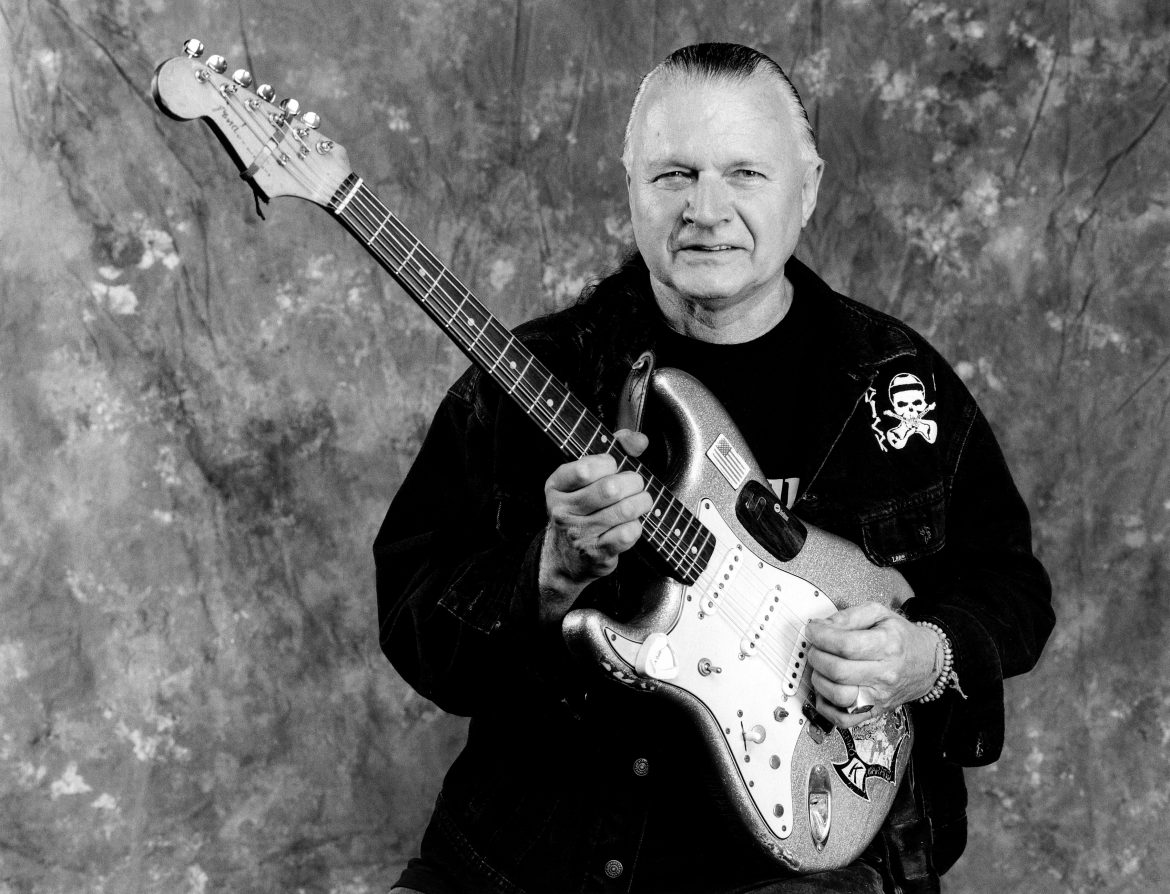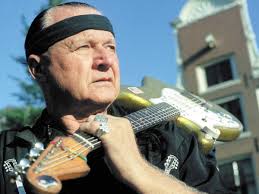
Dick Dale, The King of Surf Rock Guitar, died on March 16, 2019, after twenty years battling multiple illnesses and a lifetime of health issues. His unique and dynamic way of playing shaped a genre and inspired musicians including the Beach Boys and Jimi Hendrix. Dale was himself inspired and influenced by the Arabic scales and sounds he grew up listening to, and he combined the sounds of his father’s native Lebanon with a lot of reverb and wildly fast tempos. Dick Dale defined surf rock.
Richard Anthony Monsour (May 4, 1937 – March 16, 2019), was known as Dick Dale, and was an American rock guitarist and pioneer of surf rock music, drawing on Middle Eastern music scales and experimenting with reverberation. Dick Dale was known as “The King of the Surf Guitar”, which was also the title of his second studio album.
Dale worked closely with Fender to produce custom-made amplifiers including the first-ever 100-watt guitar amplifier. He pushed the limits of electric amplification technology and helped to develop equipment that was capable of producing a louder guitar sound without sacrificing reliability.
Richard Anthony Monsour (Dick Dale) was born in Boston, Massachusetts, of Lebanese and Polish-Belarusian descent. He learned the piano when he was nine after listening to his aunt playing, and was given a trumpet in seventh grade, and later bought himself a ukulele for $6, after having been influenced by Hank Williams. The first song he played on the ukulele was “Tennessee Waltz”. He was also influenced musically by his uncle, who taught him how to play the tarabaki, a type of drum, and could play the oud, a short-neck lute-type instrument.
Dick Dale bought a guitar from a friend for $8, paying him back in instalments. He learned to play the guitar, using both lead and rhythm styles, so that the guitar effectively also filled the place of drums. His tarabaki drumming later influenced his guitar playing, particularly his very fast alternate picking technique which he referred to this as “the pulsation”, noting all instruments he played derived from the tarabaki. The family moved to El Segundo, California in 1954 due to his father’s work.
Dick Dale learned to surf at the age of 17.
As a Lebanese-American, he retained a strong interest in Arabic music, which later played a major role in his development of surf rock music.
Dale began playing in local country bars where he met Texas Tiny, who gave him the name “Dick Dale” because he thought it was a good name for a country singer.

Dale employed non-Western scales in his playing. He regularly used reverb, which became a trademark of surf guitar. Being left-handed, Dale tried to play a right-handed guitar, but then changed to a left handed model. However, he did so without restringing the guitar, leading him to effectively play the guitar upside-down, often playing by reaching over the fretboard, rather than wrapping his fingers up from underneath. He partnered with Leo Fender to test new equipment, later saying “When it can withstand the barrage of punishment from Dick Dale, then it is fit for the human consumption.” His combination of loud amplifiers and heavy gauge strings led him to be called the “Father of Heavy Metal”.
After blowing up several Fender amplifiers, Leo Fender and Freddie Tavares saw Dale play at the Rendezvous Ballroom, Balboa, California and identified the problem arose from him creating a sound louder than the audience screaming. The pair visited the James B. Lansing loudspeaker company and asked for a custom 15-inch loudspeaker, which became the JBL D130F model, and was known as the Single Showman Amp. Dale’s combination of a Fender Stratocaster and Fender Showman Amp allowed him to attain significantly louder volume levels unobtainable by then-conventional equipment.
Dale’s performances at the Rendezvous Ballroom in Balboa in mid to late 1961 are credited with the creation of the surf music phenomenon. Dale obtained permission to use the 3,000 person capacity ballroom for surfer dances after overcrowding at a local ice cream parlor where he performed made him seek other venues. The Rendezvous ownership and the city of Newport Beach agreed to Dale’s request on the condition that he prohibit alcohol sales and implement a dress code. Dale’s events at the ballrooms, called “stomps,” quickly became legendary, and the events sold out all of the time.
“Let’s Go Trippin'” is one of the first surf rock songs. This was followed by more locally released songs, including “Jungle Fever” and “Surf Beat” on his own Deltone label. His first full-length album was Surfers’ Choice in 1962. The album was picked up by Capitol Records and distributed nationally, and Dale soon began appearing on The Ed Sullivan Show, and in films where he played his signature single “Misirlou”.
He later stated, “I still remember the first night we played it (“Misirlou”). I changed the tempo, and just started cranking on that mother. And … it was eerie. The people came rising up off the floor, and they were chanting and stomping. I guess that was the beginning of the surfer’s stomp.” His second album was named after his performing nickname, “King of the Surf Guitar”
Dick Dale later said “There was a tremendous amount of power I felt while surfing and that feeling of power was simply transferred into my guitar”. His playing style reflected the experience he had when surfing, and projecting the power of the ocean to people.
Dale and the Del-Tones performed both sides of his Capitol single, “Secret Surfin’ Spot” in the 1963 movie, Beach Party, starring Frankie Avalon and Annette Funicello. The group performed the songs “My First Love,” “Runnin’ Wild” and “Muscle Beach” in the 1964 film, Muscle Beach Party.
Surf rock’s national popularity was somewhat brief, as the British Invasion began to overtake the American charts in 1964. Though he continued performing live, Dale developed colorectal cancer. In the liner notes of Better Shred Than Dead: The Dick Dale Anthology, Dale quoted Jimi Hendrix saying, “Then you’ll never hear surf music again” in response to hearing he might be terminally ill. Dale covered “Third Stone from the Sun” as a tribute to Hendrix. Though he recovered, he retired from music for several years.
In 1979, he almost lost a leg after a pollution-related infection of a mild swimming injury. As a result, Dale became an environmental activist and soon began performing again. He recorded a new album in 1986 and was nominated for a Grammy. In 1987 he appeared in the movie Back to the Beach, playing surf music and performing “Pipeline” with Stevie Ray Vaughan.
The use of “Misirlou” in the 1994 Quentin Tarantino film Pulp Fiction gained him a new audience. The following year, John Peel praised his playing following a gig in the Garage, London. Peel later selected “Let’s Go Trippin'” as the theme tune for his BBC Radio 4 series Home Truths.
The same year, he recorded a surf-rock version of Camille Saint-Saëns’s “Aquarium” from The Carnival of the Animals for the musical score of the enclosed roller coaster, Space Mountain at Disneyland in Anaheim, California.
In 2009, Dale was inducted into the Musicians Hall of Fame and Museum in Nashville, Tennessee Dale is also a 2011 inductee into the Surfing Walk of Fame in Huntington Beach, California, in the Surf Culture category.
In June 2009, Dale began a West Coast tour from southern California to British Columbia, with approximately 20 concert dates. “Forever Came Calling” (or FCC) featured Dale’s then-17-year-old son, Jimmie Dale on drums, who opened for him. He was scheduled to play the Australian One Great Night On Earth festival to raise funds to benefit those affected by the Black Saturday bushfires and other natural disasters.
Dick Dale claimed that he was forced to keep touring to the end of his life, because of his inability to afford his medical costs. He had many health issues, including diabetes, renal failure, and vertebrae damage that made performing excruciatingly painful. At the time of his death, Dale had tour dates scheduled into November 2019.
Dale was married at least twice. In the early 1970s, his wife Jeannie Monsour was a Las Vegas dancer who worked in a revue with Dale. Their son James, also known as Jimmie, was born in 1992. Dale said in 2012 he had not spoken to Jeannie in over a decade and rarely saw James, although he sometimes played drums on his father’s tours. As of 2015, his second wife, Lana, was his manager.
Dale said that he never used alcohol or drugs, for health reasons, and discouraged their use by band members and road crew. In 1972, he stopped eating red meat. He studied Kenpo karate for over 30 years. In early 2008, he experienced a recurrence of colorectal cancer and completed a surgical, chemotherapy, and radiation treatment regimen.
Dick Dale died in Loma Linda, California on March 16, 2019, at the age of 81.
If you found this article interesting why not share it with your friends and family, and check out more about other Musicians who died in 2019.
.

